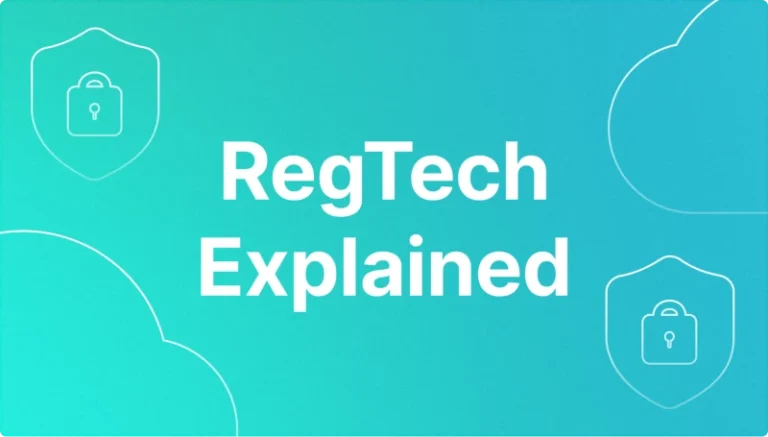Imagine Starting a Fintech Company Without Breaking the Law
Let’s say you’ve just launched a fintech startup. You’re helping people manage their budgets, send money across borders, or access loans without visiting a bank. Sounds exciting, right?
Now here’s the twist.
Behind every financial product—no matter how smart or user-friendly—is a mountain of legal rules. Rules from federal regulators, anti-money laundering laws, Know Your Customer (KYC) checks, fraud monitoring… the list is endless.
And if you don’t follow them? Fines. Legal battles. Shutdowns.
That’s where RegTech enters the picture. It’s short for Regulatory Technology, and it’s quietly doing the heavy lifting behind the scenes.
What Is RegTech in Simple Terms?
RegTech is technology designed to help companies comply with financial regulations automatically and accurately.
Think of it like an assistant that never sleeps, constantly checking if you’re following all the rules. It flags risks, helps you submit reports, and keeps regulators off your back.
You’ll find it working in:
Identity verification
Fraud detection
Anti-money laundering (AML) checks
Real-time transaction monitoring
Regulatory reporting
Risk management
Instead of hiring a large team of compliance officers, fintech startups can now automate much of that work through RegTech solutions.
Why Is RegTech So Important for Fintech?
Let’s be honest: most fintech companies are built by tech-savvy people, not legal experts. But regulators still expect them to follow the same laws as banks.
That’s a lot of pressure.
Here’s where RegTech steps in:
Saves time: Instead of combing through hundreds of pages of new regulations, software keeps track of changes for you.
Reduces errors: Humans miss things. Software doesn’t—at least not as often.
Speeds up onboarding: With instant KYC and AML checks, customers don’t wait days to get started.
Builds trust: Customers feel safer when your platform takes compliance seriously.
Avoids penalties: Regulators love companies that stay ahead of the game.
RegTech doesn’t just protect the business. It protects the users, too.
The Real-Life Problem: Compliance Is Complicated
Let’s say you’re a fintech founder based in New York, helping small businesses get same-day loans. You’re scaling fast. Investors love you.
Then one day, you get a letter: you missed filing a critical report under the Bank Secrecy Act. Or maybe your onboarding process didn’t meet KYC standards. That’s how startups get in trouble—fast.
You could spend weeks hiring lawyers and fixing your system.
Or, from the beginning, you could use a RegTech tool that automatically tracks your compliance health, sends alerts, and helps you file reports correctly.
It’s not just a tool. It’s peace of mind.
Key Areas Where RegTech Supports Fintech
Let’s break down where RegTech works hardest in a fintech setting.
1. KYC and AML Automation
You’ve probably been asked to upload your ID when signing up for a fintech app. That’s KYC.
Behind the scenes, RegTech tools:
Validate documents
Cross-check watchlists (like OFAC)
Monitor patterns that suggest money laundering
This reduces the need for manual checks and shortens customer onboarding from days to minutes.
2. Real-Time Transaction Monitoring
RegTech systems can scan thousands of transactions per second. They look for:
Unusual payment patterns
Fraud attempts
Suspicious money movement
If something looks shady, it automatically triggers alerts or blocks the transaction.
3. Regulatory Reporting
In the U.S., fintechs must submit regular reports to bodies like:
FINRA (Financial Industry Regulatory Authority)
SEC (Securities and Exchange Commission)
CFPB (Consumer Financial Protection Bureau)
RegTech tools help auto-generate these reports based on live data, reducing paperwork, stress, and errors.
4. Data Privacy and Security
With laws like GDPR and CCPA, handling customer data properly is a must.
RegTech helps fintech companies:
Classify personal data
Track where it’s stored and used
Ensure encryption and compliance with privacy rules
5. Audit Trails and Documentation
Good luck surviving a regulatory audit without solid records.
RegTech tools create automated logs of every change or decision, so you can prove your compliance if questioned.
Examples of RegTech Companies Powering Fintech
Here are a few U.S.-based RegTech platforms helping fintech stay on track:
ComplyAdvantage: Offers real-time AML monitoring and risk detection.
Trulioo: Handles global identity verification and KYC.
Socure: Provides AI-driven ID checks and fraud prevention.
Hummingbird: Helps manage investigations and compliance workflows.
Ascent: Uses AI to match fintechs with their specific regulatory obligations.
These tools are especially useful for startups trying to scale without ballooning their legal teams.
RegTech in Action: A Story You Might Relate To
Let’s take a fictional but relatable example.
Maya, a 32-year-old founder in Austin, Texas, built an app that helps freelancers save and invest small amounts weekly. Business was booming.
But once she crossed 5,000 users, regulators came knocking. She had no clue she needed to register with the SEC or report suspicious activity to FinCEN.
She nearly shut everything down—until she found a RegTech platform that helped her catch up with compliance, automate filings, and prove she wasn’t intentionally violating laws.
She didn’t just save her startup—she gained confidence and credibility. Maya’s app is now thriving, and she sleeps better at night.
Is RegTech Just for Big Companies?
Not.
If you’re a:
Solo fintech founder
Small startup team
Growing business dealing with payments, lending, insurance, crypto, or savings
Then RegTech isn’t just helpful—it’s critical.
It’s your firewall between innovation and regulation. And in the U.S., with such a patchwork of federal and state rules, you’ll need all the help you can get.
The Future of RegTech in Fintech
Here’s where it gets exciting.
More RegTech platforms are now using:
Artificial Intelligence (AI) to detect fraud faster
Natural Language Processing to read and summarize new laws
Blockchain for traceable, tamper-proof compliance records
APIs that plug directly into your fintech product
And more regulators (like the SEC and FDIC) are open to working collaboratively with fintechs using RegTech, not just punishing them when things go wrong.
In 2025, using RegTech isn’t just a good idea. It’s becoming the standard.
Choosing the Right RegTech Partner
Before you commit, here are a few things to consider:
Is it built for fintech? Some tools are designed for traditional banks. You want something lightweight and startup-friendly.
Is it scalable? Your needs at 1,000 users will be very different from when you hit 100,000.
Does it integrate well? You’ll want it to work with your CRM, payment processor, or data tools.
Do they offer support? Compliance is complex—choose a partner, not just software.
Final Thoughts: Don’t Let Compliance Kill Your Dream
You didn’t start a fintech company to become a legal expert. But ignoring compliance can end everything you’ve built.
RegTech is your shortcut to staying safe, earning trust, and focusing on what you love—building products that help people.
As more users turn to fintech apps for everything from budgeting to investing, they’re placing their trust in you. They’re hoping you’ve got their back, not just in features, but in security, privacy, and integrity.
With RegTech in your corner, you can promise exactly that.


